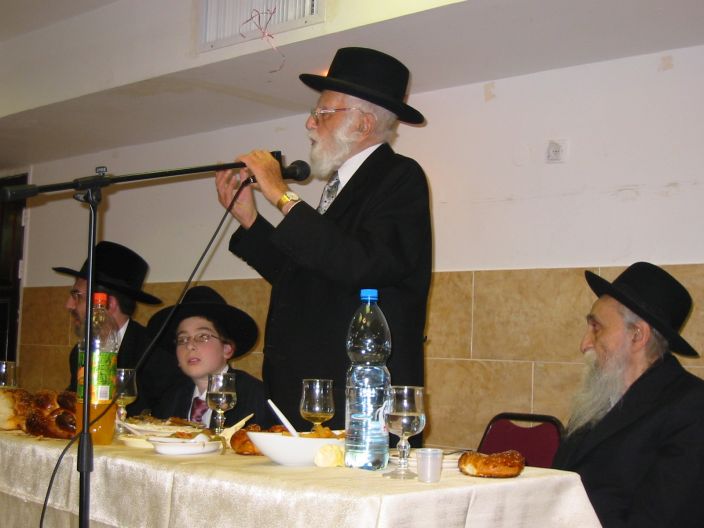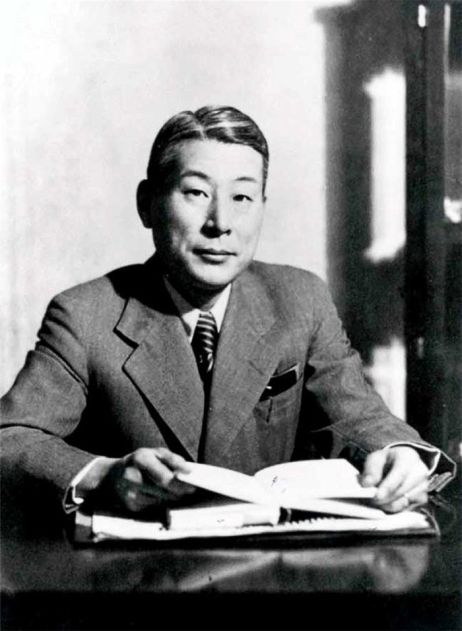| | NEWS
From Baranovitch To Mir: HaRav Leib Baron Recalls His Youth In Eastern Europe
As Told To Rabbi N Zeevi
Speaking at a bar mitzvah - HaRav Dovid Soloveitchik zt"l is at the right.

Part IV
For Part III of this series click here.
For Part V of this series click here.
HaRav Aryeh Leib Baron zt"l, was born in Horodok, which is near Volozhin. In his youth, he learned in the yeshivos of Baranovitch and Mir. Later he was the rosh yeshiva of Mercaz Hatalmud in Montreal, Canada and was known for his shiurim in both halacha and aggada, some of which have been published in his seforim: Bircas Reuven, Bircas Yehuda, Yishrei Lev, Nesivos Lev, Mesamchei Lev and Yismach Chaim, to give just a partial listing. We have published several of his essays on machshovo and hashkofo in these pages.
In these essays, based on an extended interview with HaRav Baron, he discusses the prewar European yeshiva world, upon whose approach to learning and to character development, today's yeshivos are patterned. Thanks to the magnificent memory with which he is gifted, HaRav Baron was able to describe his experiences in perfect detail, thus evoking living images of the life inside the great yeshivos of Baranovitch and Mir and of their roshei yeshiva and mashgichim.
In the last part, we read about the Mir Yeshiva, its mashgiach, HaRav Yeruchom Levovitz, zt'l, and the early part of the war as the yeshiva began its wandering under pressure of the Germans from the west and the Russians from the east.
Senpo (Chiune) Sugihara

A Visa for Japan
One of the talmidim, R' Moshe Zupnick, set out for the Japanese Embassy in Kovno. Upon his arrival, he found the Japanese consul packing his bags. He was about to close the consulate down and leave. Reb Moshe explained that the Japanese visas were necessary only in order to make it possible to use the visas for Curacao, which the Dutch Embassy had granted. The Consul laughed. How could he arrange for hundreds of visas when there was not a single clerk remaining in the Embassy? He was closing up and returning to Japan that very day!
The bochur did not give in. He pleaded with the Consul that this was the one and only chance left for rescue. If there was a technical problem, he could bring a group of bochurim who would do the work in a few hours, if only the Consul would let them have the necessary forms and stamps. The Consul agreed.
Several energetic bochurim were immediately sent for, who filled in visa forms for all the bnei yeshiva. The seal with which the forms were stamped belonged to an embassy which had technically already closed down.
According to Rav Yechezkel Leitner, the Japanese Consul, Senpo Sugihara, was later reprimanded by his superiors for his insubordination in issuing the transit visas against official policy, but he was later honored by the Jewish people for his dedicated efforts in saving the talmidim of Yeshivas Mir and other Jewish refugees.
With this important step achieved, we imagined that we would be able to flee to the United States via Japan. However one more crucial task, possibly the most difficult, still awaited us. We needed to obtain exit permits from the Russian authorities themselves.
A number of bochurim applied and, to our amazement, they were successful. When the word got around, everyone hurried to join the long line at the offices of the N.K.V.D. With a heart full of fears and hopes, I also set out in search of the coveted piece of documentation.
We knew that the more weary and tense the clerks were, the harder it would be to obtain a permit. Because of this, I rose early and set out for Kovno before daylight. I arrived early but found that three people were ahead of me. The first was an irreligious Jew. After him were the son and daughter of the Brisker Rov zt'l. I remember them arguing heatedly with the irreligious Jew over who had arrived first. Perhaps they felt that since danger to life was involved, they were obliged to make every possible effort.
In the meantime, a long, twisting line formed. At the end of the line I suddenly espied my master and teacher, Reb Elchonon!
I immediately asked the gaon HaRav Yosef Dov Soloveitchik zt'l, to keep my place in the line. I went to Reb Elchonon and proposed to him that we exchange places. He refused. I asked him again and again, arguing that as a close pupil of his, I was duty bound to honor him. He stood his ground however and refused under any circumstances.
I returned to the head of the line and after a short wait, I tendered my application. Several days later, I found out that my name was printed up on a board on the wall of the N.K.V.D. office, as one whose request for an exit permit had been accepted. Each one of the bnei hayeshiva went through this process and with wonderful siyata deShmaya, everybody received permits. This too, was really an open miracle.
The Trans Siberian Railway

Across A Continent
The next step was to raise money to pay for the long journey and efforts to raise money for travelling expenses began straight away. Each bochur received one hundred dollars from the hanholo, which had been obtained with the assistance of the Joint Distribution Committee. The householders of the towns where we lodged provided us with a variety of foods for our long journey, such as bread, butter, sausages and fruits.
We boarded a train for the twelve day journey from Kovno to Vladivostok, on the Trans-Siberian railway line. The train travelled by day and night, making only short stops at a few stations.
Travelling with us were the mashgiach Reb Chatzkel zt'l, HaRav Chaim Shmuelevitz zt'l, the Amshinover Rebbe zt'l, HaRav Reuven Grozovsky zt'l, as well as other talmidei chachomim. We all prayed together on the journey, preserving the atmosphere of the yeshiva as much as we were able.
I recall several episodes that took place along the way.
We stopped for some time in Moscow and boarded in a local hotel called the Novomoscovsk — the New Moscow. HaRav Mendel Zaks zt'l, the son-in-law of the Chofetz Chaim, was also there at the time. A bearded Jew suddenly approached me, speaking in Yiddish and introducing himself as the shames of the Moscow synagogue. "Could you do me a favor and show me the Chofetz Chaim's son-in-law? I've heard that he's staying here."
Well, I thought, if another Jew wanted to meet a famous tzaddik, why not? I told him exactly where Reb Mendel was and returned to the train.
It was only several days later that eye witnesses told me what had happened afterwards. The man had gone to Reb Mendel and asked him, "Could you perhaps tell me why the Chofetz Chaim ruled that it is even permitted to leave Russia on Shabbos?"
[On hearing this,] Reb Mendel turned white from shock and fled. When I heard about this, I put my head in my hands. I understood that the shames was one of the Jewish religious functionaries who served the Communists. In my naivete, I had unwittingly endangered Reb Mendel.
The Trans Siberian Railway Route

Helping Jews in Siberia
At one of the subsequent stops, Irkutsk, the train's doors were opened for ten minutes, to rest and get some fresh air. One of the bochurim noticed a Jewish looking man walking around near the station, looking downcast. A brief conversation revealed that the man was a Jewish lawyer from the Polish town of Kattowitz. He had been the President of that town's Zionist Organization and had been exiled to Siberia together with the other Jewish leaders. The bochur asked him if he needed anything and the man replied that while he had food, he was in need of money.
The bochur returned to us and told us about this Jew [stranded] in Siberia, who needed money. Several hundred rubles were collected and the bochur went to hand over this tzedaka money. As he handed the money over the man said, "I can feel inquisitive eyes examining us. I'm afraid that once you leave me, they will arrest me."
As he left, the bochur noted the immediate arrival on the scene of two Russian intelligence men, who forcibly removed the man from the station. Whatever the outcome, we felt good. We had performed an act of kindness towards a fellow Jew, which would stand us in good stead on our road to rescue.
Two days later, we stopped again. The bochurim stood by the doors looking at the frozen, unfamiliar landscape. Two soldiers approached the carriage. One was a Jew from Lemberg who had been conscripted into the Russian army, while the second soldier was a Russian gentile.
The Jewish soldier saw that we were Jewish and tendered a different request to that of the lawyer. He was neither lacking money, nor would it help him. He was hungry. We immediately passed down the carriages calling, "There is a hungry Jew here. Let's have some food!"
We placed the items which each bochur donated from his own package into a large bag. We returned to him with the bag full to overflowing. He didn't have [enough] words to thank us. When we handed the bag over, we noticed the eyes of his Russian companion bulging with envy — he too, was starving. We called to the Jewish soldier and asked him to divide the food with the Russian for the sake of peace.
We hoped that with this added act of kindness which we performed, we would merit the fulfillment of [Chazal's teaching,] `Whoever has mercy on his fellow creatures, receives Heaven's mercy.'
We arrived in Vladivostok and needed to board a boat for Japan. Before leaving on our boat, we had to endure one further ordeal, an ordeal that was no less difficult than its predecessors. A panel of interrogators was interested in knowing what possible reasons we could have for wanting to leave Russia, which was a paradise, according to official Communist doctrine.
Our hearts were heavy as we recalled Reb Yonah Minsker's warning that at the last moment, our whole group would be banished to Siberia.
We stood in line with all our documents: Polish passports, Dutch visas for Curacao, Japanese transit visas and Russian exit papers from the N.K.V.D. office in Kovno. The bochurim were questioned as to why they didn't choose to remain in Russia with their parents. Many answered that their parents were no longer alive.
However, when we saw that the proportion of `orphans' was growing too large, we feared that the interrogators would latch on to the ruse and we had to invent new excuses. I, for example, told them that my father was in America, enjoying financial success and that he had invited me to join him to share his prosperity.
We embarked. Our vessel was a cargo boat, laden with freight, with no provision for passengers. Later, we found out that the rickety boat survived for only a short time after our journey. It made three passages, on the last of which it completed the transfer of the yeshiva. After that, it sank!
For some time, we were forced to contain our joy at having escaped the territory of accursed Russia. Our ship carried several Russian chaperones, employed by the Russian Intelligence. They accompanied us for part of the way, until we had left Russian territorial waters. As long as they were with us, a deathly silence hung over the boat. Nobody said a word. We were afraid they might backtrack at the last minute.
The moment they disembarked, the tense silence was over. There was a great commotion as people went over to one another, shook hands, sang and broke into a spontaneous dance.
First Encounters in the Far East
There were of course, no beds aboard the cargo boat and at night we fell asleep on the floor. When we arrived in Japan's Chiroga Harbor, we were informed that the cargo would be unloaded, for which purpose the deck was removed and the freight was removed over many hours. We were left with nowhere to stand, let alone sit down or go to sleep. Throughout an entire night, all the passengers were crowded together like sardines in corners of the deck.
It took us some time to adjust to the change in our surroundings. All at once, the freezing climate of Vladivostok gave way to the fresh, pleasant, spring like air of the Japanese harbor. Citrus fruits — which we had never before seen in our lives — were for sale in the shops on land. However, we had no money at all with which to buy anything.
The last day we spent on the boat was Purim. After the megilla had been read, we all gathered together. Amongst the passengers was Reb Dovid Pastek, a fervent Gerrer chossid, a talmid of the Lublin Yeshiva and a wonderful chazan and singer.
He started teaching us a tune for Vehi She'omdo. Together, we sang and danced in unison as thoughts of all the trials and tribulations which we had undergone passed through our minds. It was an emotional scene: hundreds of bochurim weeping as they sang the words, "For more than one has arisen over us to destroy us and HaKodosh Boruch Hu saves us from their hands." Thus we sang as we wept and wept as we sang.
We were not allowed to disembark for four days. The Japanese authorities regarded us with suspicion and great hostility. Authorization to leave the boat came out of the blue one Shabbos morning in the form of an order "to disembark from the boat and board the train."
It being Shabbos, we were at a loss as to what to do. However, when we saw the great Torah scholars who were with us getting onto the train we realized that our lives were at stake in the hostile war atmosphere which then prevailed. On Shabbos itself, we followed the mashgiach Reb Chatzkel, the rosh yeshiva Reb Chaim, the Amshinover Rebbe, HaRav Reuven Grozovsky and others, onto the train.
End of Part IV
|




